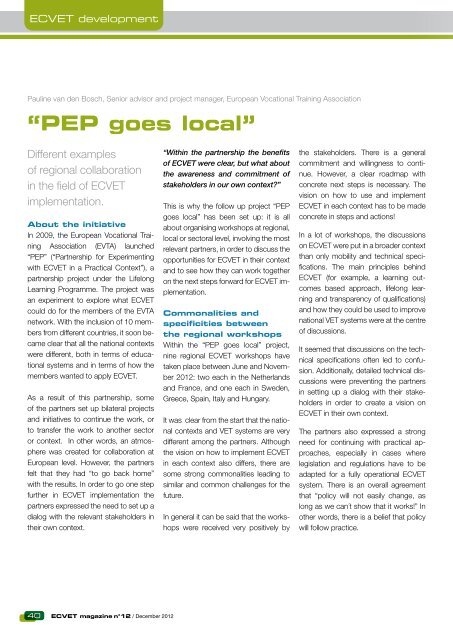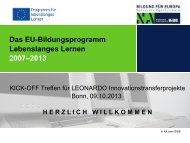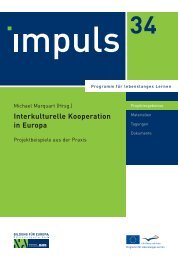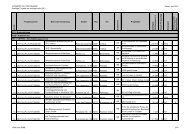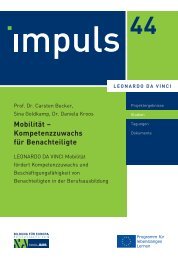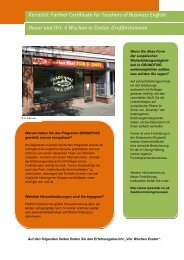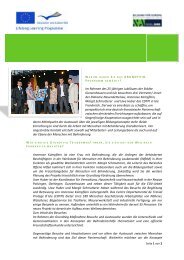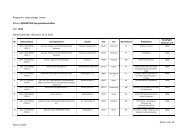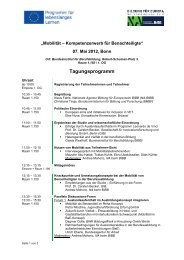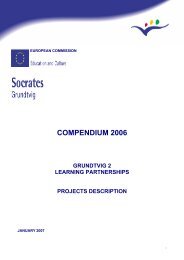You also want an ePaper? Increase the reach of your titles
YUMPU automatically turns print PDFs into web optimized ePapers that Google loves.
ECVET development<br />
Pauline van den Bosch, Senior advisor and project manager, European Vocational Training Association<br />
“PEP goes local”<br />
Different examples<br />
of regional collaboration<br />
in the field of ECVET<br />
implementation.<br />
About the initiative<br />
In 2009, the European Vocational Training<br />
Association (EVTA) launched<br />
“PEP” (“Partnership for Experimenting<br />
with ECVET in a Practical Context”), a<br />
partnership project under the Lifelong<br />
Learning Programme. The project was<br />
an experiment to explore what ECVET<br />
could do for the members of the EVTA<br />
network. With the inclusion of 10 members<br />
from different countries, it soon became<br />
clear that all the national contexts<br />
were different, both in terms of educational<br />
systems and in terms of how the<br />
members wanted to apply ECVET.<br />
As a result of this partnership, some<br />
of the partners set up bilateral projects<br />
and initiatives to continue the work, or<br />
to transfer the work to another sector<br />
or context. In other words, an atmosphere<br />
was created for collaboration at<br />
European level. However, the partners<br />
felt that they had “to go back home”<br />
with the results. In order to go one step<br />
further in ECVET implementation the<br />
partners expressed the need to set up a<br />
dialog with the relevant stakeholders in<br />
their own context.<br />
40 ECVET magazine n°12 / December 2012<br />
“Within the partnership the benefits<br />
of ECVET were clear, but what about<br />
the awareness and commitment of<br />
stakeholders in our own context?”<br />
This is why the follow up project “PEP<br />
goes local” has been set up: it is all<br />
about organising workshops at regional,<br />
local or sectoral level, involving the most<br />
relevant partners, in order to discuss the<br />
opportunities for ECVET in their context<br />
and to see how they can work together<br />
on the next steps forward for ECVET implementation.<br />
Commonalities and<br />
specificities between<br />
the regional workshops<br />
Within the “PEP goes local” project,<br />
nine regional ECVET workshops have<br />
taken place between June and November<br />
2012: two each in the Netherlands<br />
and France, and one each in Sweden,<br />
Greece, Spain, Italy and Hungary.<br />
It was clear from the start that the national<br />
contexts and VET systems are very<br />
different among the partners. Although<br />
the vision on how to implement ECVET<br />
in each context also differs, there are<br />
some strong commonalities leading to<br />
similar and common challenges for the<br />
future.<br />
In general it can be said that the workshops<br />
were received very positively by<br />
the stakeholders. There is a general<br />
commitment and willingness to continue.<br />
However, a clear roadmap with<br />
concrete next steps is necessary. The<br />
vision on how to use and implement<br />
ECVET in each context has to be made<br />
concrete in steps and actions!<br />
In a lot of workshops, the discussions<br />
on ECVET were put in a broader context<br />
than only mobility and technical specifications.<br />
The main principles behind<br />
ECVET (for example, a learning outcomes<br />
based approach, lifelong learning<br />
and transparency of qualifications)<br />
and how they could be used to improve<br />
national VET systems were at the centre<br />
of discussions.<br />
It seemed that discussions on the technical<br />
specifications often led to confusion.<br />
Additionally, detailed technical discussions<br />
were preventing the partners<br />
in setting up a dialog with their stakeholders<br />
in order to create a vision on<br />
ECVET in their own context.<br />
The partners also expressed a strong<br />
need for continuing with practical approaches,<br />
especially in cases where<br />
legislation and regulations have to be<br />
adapted for a fully operational ECVET<br />
system. There is an overall agreement<br />
that “policy will not easily change, as<br />
long as we can´t show that it works!” In<br />
other words, there is a belief that policy<br />
will follow practice.


